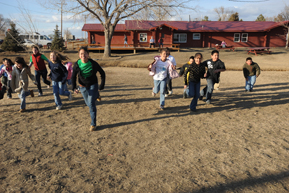Changes in Spring Break Service Reflect Changing Times
ASB program adds 12 trips, cuts 5

Back in 1987, a group of seven Boston University students piled into a van and headed south to spend a week volunteering in Boone, N.C.; 21 years later, their legacy continues to thrive. Last spring, 300 volunteers traveled more than 63,000 miles and clocked in nearly 36,000 hours of service in communities as far as Quebec, Dupree, S.D., and Austin, Tex.
The Alternative Spring Break (ASB) program, organized by BU’s Community Service Center (CSC), attracts hundreds of student volunteers and staff chaperones, who spend a week in March working in disaster zones and troubled communities across the country. Many of the issues at hand remain the same: hunger and homelessness, disability awareness, and disaster relief are still the focus on trips each year. Two decades into the program, however, the lineup has changed to reflect a changing world and students’ changing interests.
“We really wanted to expand on certain issue areas, particularly lesbian, gay, bisexual, and transgender [LGBT] issues and the environment,” says program manager Jessica Tannhauser (SMG’09).
In addition, to accommodate ASB’s increasing popularity, Tannhauser and the other program manager, Anne Hetherington (SMG’09), expanded the 2009 trip lineup from 25 to 32, adding 12 new destinations and eliminating 5.
“We always have a waiting list of about 100 students,” says Tannhauser, “so we’re hoping the additional trips will help to alleviate the high demand.”
The new ASB destinations range from the country’s largest cities to the most remote of Appalachian villages, and the lineup includes a little bit of everything, from working in a New York City soup kitchen to restoring caves in Horse Cave, Ky., to caring for homeless animals in Chicago to tutoring children in Kincaid, W. Va.
At the Gay Men’s Health Crisis in New York City, students will spend a week volunteering at the country’s oldest and largest AIDS service organization, and at the Triangle Foundation in Detroit, they will work with LGBT youth.
Additional environmental trips include trail maintenance projects at Harper’s Ferry National Historical Park in Harper’s Ferry, W. Va., and at Lake Metroparks in Lake County, Ohio, and cave restoration projects at the American Cave Conservation Association in Horse Cave, Ky.
For students who want to work with special needs children and the disabled, Hetherington and Tannhauser added trips to the Champion Athletes of the Ozarks, in Springfield, Mo., and the Pace School, in Pittsburgh, Pa.
While many ABS trips take hours — even days — of travel from New England, the majority of the new trips are within half a day’s drive of Boston, and some, such as the New York City and Washington, D.C., trips, will even use public transportation. “Using public transportation greatly decreases risks,” Hetherington says, “and fewer students will need to be trained to drive the vans.”
Students who participate in trips closer to Boston will also have more time to volunteer, Lindsey Wyld, CSC manager, points out. “In previous years, students spent almost as many days crammed in the van as they did working at their site,” she says. “But students who go to places like New York or Maine will have two full extra days to volunteer.”
Wyld hopes that students volunteering for the trips nearer to Boston will develop a broader perspective of the problems in their own communities. “Understanding the issues that affect New England is just as important as understanding the issues that affect rural Kentucky,” she says. “I think these closer trips will make the service a little more real and a little more relatable.”
As well as adding 12 trips, Hetherington and Tannhauser eliminated 5 of the farthest destinations: Austin, Tex., Dupree, S.D., Killeen, Tex., Palm Beach, Fla., and Tahlequah, Okla. “It was an extremely hard decision to make,” says Hetherington, who went to Tahlequah two years ago. “But because of increasing safety concerns and rising fuel costs, it made better sense to cut the 5 most expensive trips and replace them with 12 trips that are closer to Boston.”
The choice to remove Dupree and Tahlequah was particularly difficult, Hetherington adds, because no other trips go to Native American reservations. “We looked for reservations that were closer to Massachusetts, but we couldn’t find any that could accommodate us,” she says.
Not surprisingly, the decision resulted in some disappointment. “ASB volunteers form extremely strong attachments to their trips,” Hetherington says, “and we’ve received lots of angry e-mails and phone calls from students. But once we explain our reasoning behind the cancellations, they tend to calm down.”
Tannhauser, who has participated in ASB for three years, is confident that the new trips will be just as popular as the five that were discontinued. “Every trip is completely different,” she says, “and each one offers volunteers a unique experience. I wouldn’t trade any of my ASB experiences for anything.”
Registration for Alternative Spring Break will take place on Monday, February 9, 2009; the program is currently accepting applications for trip chaperones. Visit the ASB Web site for more information.
Vicky Waltz can be reached at vwaltz@bu.edu.
Comments & Discussion
Boston University moderates comments to facilitate an informed, substantive, civil conversation. Abusive, profane, self-promotional, misleading, incoherent or off-topic comments will be rejected. Moderators are staffed during regular business hours (EST) and can only accept comments written in English. Statistics or facts must include a citation or a link to the citation.